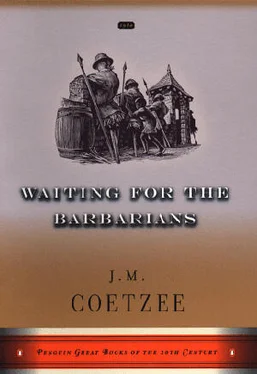So I sing for my keep. And if I am still hungry in the evening, if I wait at the barracks gate for the whistle that calls the dogs and slip in quietly enough, I can usually wheedle out of the maids the leftovers from the soldiers' supper, a bowl of cold beans or the rich scrapings of the soup-pot or half a loaf of bread.
Or in the mornings I can saunter over to the inn and, leaning over the flap of the kitchen door, breathe in all the good smells, marjoram and yeast and crisp chopped onions and smoky mutton-fat. Mai the cook greases the baking-pans: I watch her deft fingers dip into the pot of lard and coat the pan in three swift circles. I think of her pastries, the renowned ham and spinach and cheese pie she makes, and feel the saliva spurt in my mouth.
"So many people have left," she says, turning to the great ball of dough, "I can't even begin to tell you. A sizable party left only a few days ago. One of the girls from here-the little one with the long straight hair, you may remember her-she was one of them, she left with her fellow." Her voice is flat as she imparts the information to me, and I am grateful for her considerateness. "Of course it makes sense," she continues, "if you want to leave you must leave now, it's a long road, dangerous too, and the nights are getting colder." She talks about the weather, about the past summer and signs of approaching winter, as though where I had been, in my cell not three hundred paces from where we stand, I had been sealed off from hot and cold, dry and wet. To her, I realize, I disappeared and then reappeared, and in between was not part of the world.
I have been listening and nodding and dreaming while she talks. Now I speak. "You know," I say, "when I was in prison-in the barracks, not in the new prison, in a little room they locked me into-I was so hungry that I did not give a thought to women, only to food. I lived from one mealtime to the next. There was never enough for me. I bolted my food like a dog and wanted more. Also there was a great deal of pain, at different times: my hand, my arms, as well as this"-I touch the thickened nose, the ugly scar under my eye by which, I am beginning to learn, people are surreptitiously fascinated. "When I dreamed of a woman I dreamed of someone who would come in the night and take the pain away. A child's dream. What I did not know was how longing could store itself away in the hollows of one's bones and then one day without warning flood out. What you said a moment ago, for instance-the girl you mentioned-I was very fond of her, I think you know that, though delicacy prevented you… When you said she was gone, I confess, it was as if something had struck me here, in the breast. A blow."
Her hands move deftly, pressing circles out of the sheet of dough with the rim of a bowl, catching up the scraps, rolling them together. She avoids my eyes.
"I went upstairs to her room last night, but the door was locked. I shrugged it off. She has a lot of friends, I never thought I was the only one… But what did I want? Somewhere to sleep, certainly; but more too. Why pretend? We all know, what old men seek is to recover their youth in the arms of young women." She pounds the dough, kneads it, rolls it out: a young woman herself with children of her own, living with an exacting mother: what appeal am I making to her as I ramble on about pain, loneliness? Bemused I listen to the discourse that emerges from me. "Let everything be said!" I told myself when I first faced up to my tormentors. "Why clamp your lips stupidly together? You have no secrets. Let them know they are working on flesh and blood! Declare your terror, scream when the pain comes! They thrive on stubborn silence: it confirms to them that every soul is a lock they must patiently pick. Bare yourself! Open your heart!" So I shouted and screamed and said whatever came into my head. Insidious rationale! For now what I hear when I loosen my tongue and let it sail free is the subtle whining of a beggar. "Do you know where I slept last night?" I hear myself saying. "Do you know that little lean-to at the back of the granary?…"
But above all it is food that I crave, and more intensely with every passing week. I want to be fat again. There is a hunger upon me day and night. I wake up with my stomach yawning, I cannot wait to be on my rounds, loitering at the barracks gate to sniff the bland watery aroma of oatmeal and wait for the burnt scrapings; cajoling children to throw me down mulberries from the trees; stretching over a garden fence to steal a peach or two; passing from door to door, a man down on his luck, the victim of an infatuation, but cured now, ready with a smile to take what is offered, a slice of bread and jam, a cup of tea, in the middle of the day perhaps a bowl of stew or a plate of onions and beans, and always fruit, apricots, peaches, pomegranates, the wealth of a bounteous summer. I eat like a beggar, gobbling down my food with such appetite, wiping my plate so clean that it does the heart good to see it. No wonder I am day by day creeping back into the good books of my countrymen.
And how I can flatter, how I can woo! More than once have I had a tasty snack prepared especially for me: a mutton chop fried with peppers and chives, or a slice of ham and tomato on bread with a wedge of goats' milk cheese. If I can carry water or firewood in return, I do so gladly, as a token, though I am not as strong as I used to be. And if for the time being I have exhausted my sources in the town-for I must be careful not to become a burden on my benefactors-I can always stroll down to the fisherfolk's camp and help them clean fish. I have learned a few words of their language, I am received without suspicion, they understand what it is to be a beggar, they share their food with me.
I want to be fat again, fatter than ever before. I want a belly that gurgles with contentment when I fold my palms over it, I want to feel my chin sink into the cushion of my throat and my breasts wobble as I walk. I want a life of simple satisfactions. I want (vain hope!) never to know hunger again.
* *
Nearly three months since it departed, and still there is no news of the expeditionary force. Instead, terrible rumours everywhere: that the force has been lured into the desert and wiped out; that unknown to us it has been recalled to defend the homeland, leaving the frontier towns for the barbarians to pick like fruit whenever they choose to. Every week there is a convoy of the prudent leaving town, going east, ten or twelve families travelling together "to visit relatives", as the euphemism has it, "till things settle down again". They leave, leading pack-trains, pushing handcarts, carrying packs on their backs, their very children laden like beasts. I have even seen a long low four-wheeled cart drawn by sheep. Pack-animals can no longer be bought. Those who depart are the sensible ones, the husbands and wives who lie awake in bed whispering, making plans, cutting losses. They leave their comfortable homes behind, locking them "till we return", taking the keys as a memento. By the next day gangs of soldiers have broken in, looted the houses, smashed the furniture, fouled the floors. Resentment builds up against those who are seen to be making preparations to go. They are insulted in public, assaulted or robbed with impunity. Now there are families that simply disappear in the dead of night, bribing the guards to open the gates for them, taking the east road and waiting at the first or second stopping-place till the party that accumulates is large enough to travel safely.
The soldiery tyrannizes the town. They have held a torch-light meeting on the square to denounce "cowards and traitors" and to affirm collective allegiance to the Empire. WE STAY has become the slogan of the faithful: the words are to be seen daubed on walls everywhere. I stood in the dark on the edge of the huge crowd that night (no one was brave enough to stay at home) listening to these words chanted ponderously, menacingly from thousands of throats. A shiver ran down my back. After the meeting the soldiers led a procession through the streets. Doors were kicked in, windows broken, a house set on fire. Till late at night there was drinking and carousing on the square. I looked out for Mandel but did not see him. It may be that he has lost control of the garrison, if indeed the soldiers were ever prepared to take orders from a policeman.
Читать дальше












